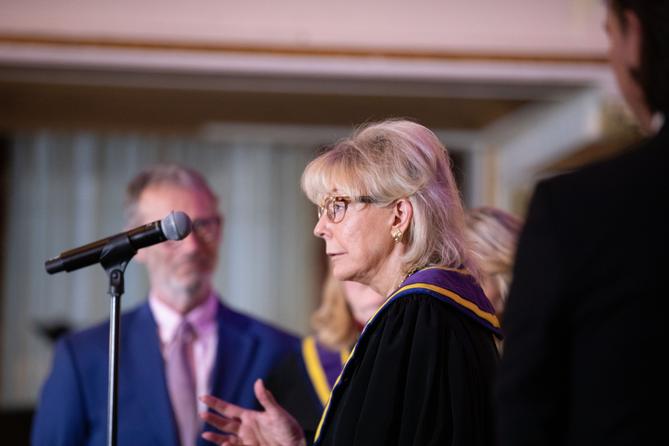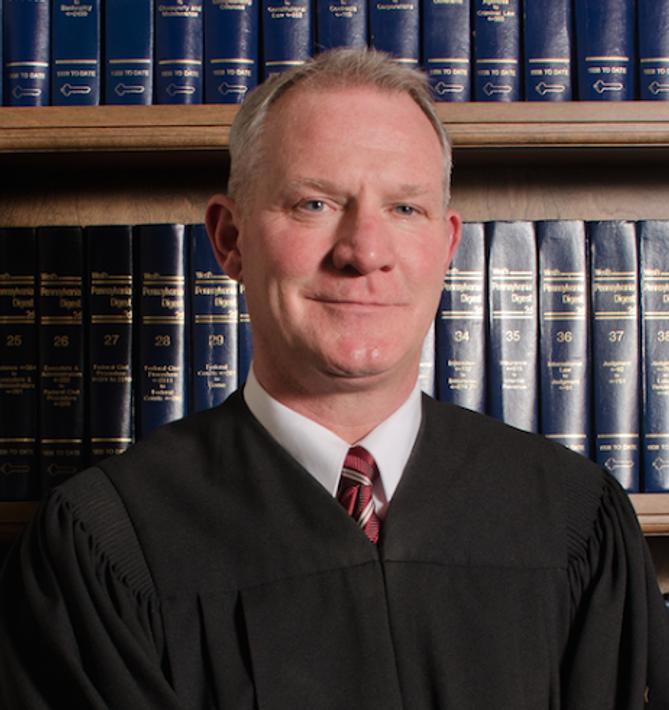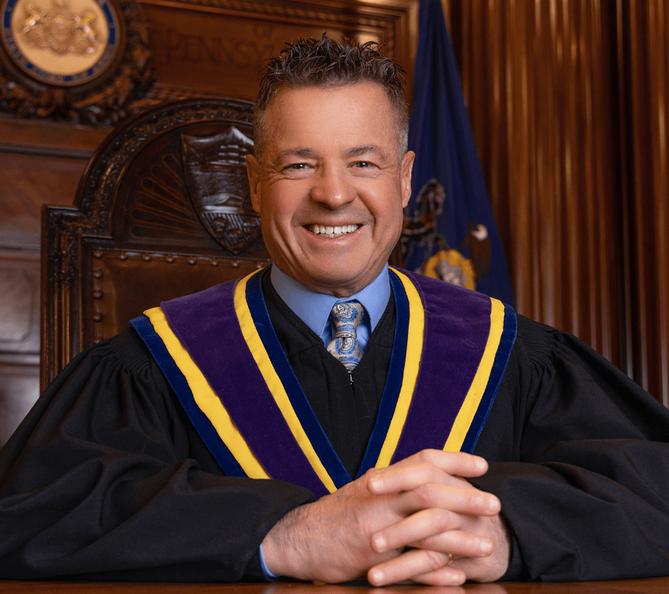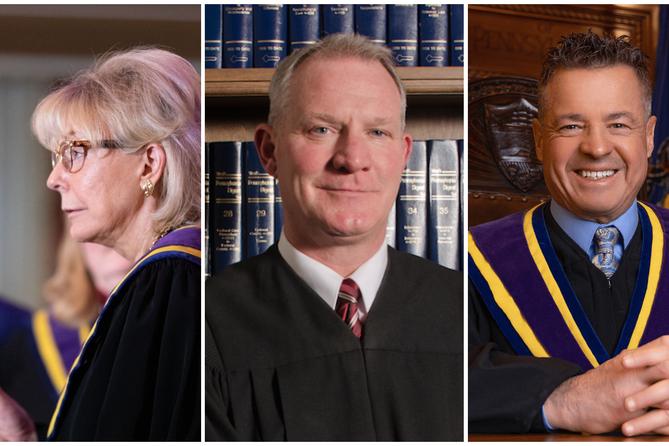UPDATE, Nov. 4: All 3 Democratic Supreme Court justices win retention races
HARRISBURG — Three Pennsylvania Supreme Court justices are up for retention on Nov. 4, in elections that could set the stage for a total remaking of the court.
Justices Christine Donohue, Kevin Dougherty, and David Wecht were all elected as Democrats in 2015, and their party has held a majority on the state’s high court since. Republicans are pushing Pennsylvanians to vote “no” on their retention, which would lead to contested, partisan elections in 2027.
The commonwealth’s top appellate court, controlled by a Democratic majority, has made dozens of high-profile decisions over the past decade that have shaped politics and policy. The accumulated impact has been noticeable to legal scholars — as well as political opponents.
In 2019, state constitutional scholar Bruce Ledewitz told the Pennsylvania Capital-Star that while the court could be “activist,” it was also “very well-grounded by the text and history of the Pennsylvania Constitution.”
But in a recent Post-Gazette op-ed he was more critical, saying that particularly on issues like redistricting, elections, and COVID-19, the court “has favored Democratic Party interests” — though he also added, “it is not accurate to say that these three justices are purely partisan.”
The Pennsylvania Bar Association, which makes judicial recommendations based largely on judges’ reputations in the legal community, has meanwhile said all three Democrats should be retained, variously calling them “fair,” “open to consideration of differing perspectives,” and “logical.”
The high court races are expected to attract millions of dollars in spending, the first hints of which have started to appear on Pennsylvanians’ computer and TV screens in the past month.
Two judges on lower appellate courts are also up for retention, both of whom were also elected as Democrats. Voters will decide whether to give Alice Dubow another term on the Superior Court, and whether Michael Wojcik should have another term on Commonwealth Court.
There are also partisan, contested elections happening for both the Commonwealth and Superior Courts.
Read on to learn about the backgrounds and qualifications of Supreme Court justices up for retention, how they ruled on the key cases of the past decade, and their reputations among their peers.

Justice Christine Donohue
Donohue, a native of northeast Pennsylvania, attended East Stroudsburg University, got her law degree from Duquesne University in 1980, and has since been based in Allegheny County.
She spent decades as a civil trial lawyer and litigator, including for Pittsburgh-based firm Buchanan Ingersoll & Rooney, and began her career representing victims in personal injury cases before working in commercial litigation.
Starting in 2007, Donohue served for eight years as a justice on the Superior Court of Pennsylvania. One of the two intermediate appellate courts in the state, Superior Court largely focuses on criminal, family, and civil cases that are appealed up from county Courts of Common Pleas.
Donohue has also served on a variety of legal professional boards, including the Judicial Conduct Board, which investigates allegations of misconduct against judges, and the Pennsylvania Board of Law Examiners, which assesses individuals applying to join the state bar association.
Since her election to the state Supreme Court in 2015, Donohue has been the primary author on a number of high-profile decisions, including one in 2022 that upheld Pennsylvania’s no-excuse mail voting law, Act 77. A lower court had struck down the law as unconstitutionally enacted by statute rather than amendment.
“We find no restriction in our Constitution on the General Assembly’s ability to create universal mail-in voting,” she wrote.
She also wrote the 2024 decision that demanded a lower court take a second look at a case, brought by a handful of reproductive health providers, on whether the state constitution protects access to abortion.
She based that ruling on, among other things, what she framed as “the unremarkable conclusion that to treat a woman differently based on a characteristic unique to her sex is to treat her differently because of her sex, which triggers enforcement of our Equal Rights Amendment.”
While that case is pending before Commonwealth Court, it will likely go back to the high court.
At a September forum with the other retention candidates, Donohue said of her reason for pursuing a new term, “I want to be certain that the seeds that we've sown in terms of extending protections that have always been there, but have not been recognized, under the Pennsylvania Constitution continue to be recognized by the court that I sit on.”
If she is retained, Donohue will be able to serve on the court only until 2027, when she’ll reach the mandatory retirement age of 75.
In Donohue’s most recent statement of financial interest, she reported just over $3,200 in reimbursements for airfare, lodging, and meals related to a meeting hosted by the Pennsylvania Bar Association in late January.
Donohue is recommended for retention by the Pennsylvania Bar Association, which wrote that she has a reputation as a “jurist who is thorough and well-prepared for oral arguments, treats litigants respectfully, is smart and fair, and is attentive and engaged during oral arguments.”
Read her PBA questionnaire here.

Justice Kevin Dougherty
A native of Philadelphia, Dougherty received a bachelor’s degree from Temple University and his law degree from Antioch School of Law in Washington, D.C., graduating in 1987.
He began his career with a five-year stint as an assistant district attorney in Philadelphia before opening a private practice, Marino & Dougherty, in 1995. There, he spent six years working primarily in family law and criminal defense.
In 2001, former Republican Gov. Tom Ridge appointed Dougherty to the Philadelphia Court of Common Pleas, and the judge won a race to keep his position later that year. He retained the seat again in 2012.
Dougherty spent most of his Common Pleas tenure in the Family Division, which has jurisdiction over cases relating to parental rights, adoption proceedings, and domestic violence. He was appointed an administrative judge of the division, where he was charged with tasks such as assigning judges to cases.
On his campaign website, Dougherty highlights that after his 2015 election to the state Supreme Court, he took particular interest in mental health. This included a “statewide behavioral health initiative” that involved the establishment, last year, of an Office of Behavioral Health within the courts, and another program that created sensory-friendly courtrooms to accommodate people on the autism spectrum.
Frustrations with refereeing disputes between the branches of government have often appeared in Dougherty’s writing, including in a 2022 concurring decision in favor of the court adopting a congressional map due to a deadlock between then-Gov. Tom Wolf, a Democrat, and the GOP-controlled General Assembly.
“It is an unfortunate reality that when our Commonwealth’s legislative and executive branches succeed only in creating a void,” he wrote, “we have no choice but to step once again into the breach.”
In 2020, Dougherty sided only partially with his Democratic colleagues when they ruled the legislature did not have the right to eliminate Wolf’s pandemic emergency powers. While Dougherty agreed the legislature’s resolution was not binding, he argued it also showed constitutional contradictions within the state’s emergency response law. As such, he argued, the entire law should be struck down as unconstitutional.
Such a finding, Dougherty wrote, may be “strong medicine” during the pandemic, but was legally necessary.
Dougherty’s family is well-known in Philadelphia politics. His brother, John Dougherty, was for decades the head of Local 98 of the International Brotherhood of Electrical Workers and a singularly powerful force in the city. Last year, a federal judge sentenced John Dougherty to six years in prison after convictions for bribing a city council member and embezzlement.
Kevin Dougherty’s son, Sean Dougherty, is a member of the state House, serving northeast Philadelphia.
Dougherty was recommended for retention by the Pennsylvania Bar Association, which wrote that attorneys who work with him “describe him as attentive, smart, well prepared, open to consideration of differing perspectives with a temperament and demeanor that is respectful and professional.”
Read his PBA questionnaire here.

Justice David Wecht
Born in Maryland, Wecht moved to the Pittsburgh area as a child. He later attended Yale College for his undergraduate studies, then Yale Law School, graduating with his J.D. in 1987.
Wecht began his career in Washington, D.C., first clerking for a federal judge, then practicing at a private firm before returning to Pittsburgh. He opened the Wecht Law Firm in the city in 1996.
In 1998, Wecht was elected to serve as the register of wills and clerk of the Orphans Court of Allegheny County. During his 2015 Supreme Court race, he told LNP | Lancaster Online that this role stoked his interest in a judicial career, saying that he enjoyed judging will contests — in which the validity of a will is challenged — and “applying the rules of evidence, the rules of civil procedure.”
Wecht was elected to the Allegheny County Court of Common Pleas in 2003. During his time on the bench, he served as an administrative judge in the Family Division, assigning fellow judges to cases.
He was elected to the Superior Court in 2011, then ran for and won a seat on the Supreme Court in 2015.
Wecht has also taught law at various universities over the course of his career. He has been an adjunct professor at Duquesne University School of Law since 1997, an instructor at the College of General Studies at the University of Pittsburgh since 2010, and a visiting professor at the Harry Radzyner Law School at Israel’s Reichman University since 2022. He was also a professor at East China University of Political Science and Law in Shanghai from 2017 to 2020.
According to his statement of financial interest, Wecht reported $20,000 in reimbursements last year — the most any of the state Supreme Court judges up for retention reported. These were mostly to cover travel and lodging expenses related to speaking engagements, though the biggest, $7,000, was an expenses stipend for teaching at Reichman University.
Among the opinions Wecht has written as a Supreme Court justice were the 2020 ruling upholding Gov. Tom Wolf’s pandemic powers, in which he argued that the “Pennsylvania Constitution does not empower the legislature to act unilaterally to suspend” the state’s disaster law, from which Wolf had claimed his authority.
He also wrote a 2019 decision upholding a Pittsburgh law allowing the city to require private employers to give workers paid sick leave, over objections from business groups. In the opinion, Wecht wrote that such an ordinance was within the city’s “express statutory authority to legislate in furtherance of disease control and prevention.”
He also authored the 2017 decision that allowed poor school districts a trial against Pennsylvania's legislature for unconstitutionally underfunding public schools.
“It remains for Petitioners to … establish the nature of the right to education,” Wecht wrote for the majority. “But Petitioners are entitled to the opportunity to do so.”
The school districts would win their case six years later.
Wecht was recommended for retention by the Pennsylvania Bar Association, which wrote that he “gives careful consideration to oral arguments, and discharges his duties as a justice with fairness, equity, and respect to all.”
Read his PBA questionnaire here.
